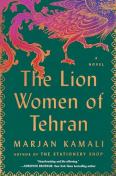BKMT READING GUIDES
The Lion Women of Tehran
by Marjan Kamali
Hardcover : 336 pages
66 clubs reading this now
3 members have read this book
An “evocative read and a powerful portrait of friendship, feminism, and political activism” (People) set against three transformative decades in Tehran, Iran—from nationally bestselling author Marjan Kamali.
In 1950s Tehran, seven-year-old Ellie lives in ...
Introduction
NATIONAL BESTSELLER
An “evocative read and a powerful portrait of friendship, feminism, and political activism” (People) set against three transformative decades in Tehran, Iran—from nationally bestselling author Marjan Kamali.
In 1950s Tehran, seven-year-old Ellie lives in grand comfort until the untimely death of her father, forcing Ellie and her mother to move to a tiny home downtown. Lonely and bearing the brunt of her mother’s endless grievances, Ellie dreams for a friend to alleviate her isolation.
Luckily, on the first day of school, she meets Homa, a kind girl with a brave and irrepressible spirit. Together, the two girls play games, learn to cook in the stone kitchen of Homa’s warm home, wander through the colorful stalls of the Grand Bazaar, and share their ambitions of becoming “lion women.”
But their happiness is disrupted when Ellie and her mother are afforded the opportunity to return to their previous bourgeois life. Now a popular student at the best girls’ high school in Iran, Ellie’s memories of Homa begin to fade. Years later, however, her sudden reappearance in Ellie’s privileged world alters the course of both of their lives.
Together, the two young women come of age and pursue their own goals for meaningful futures. But as the political turmoil in Iran builds to a breaking point, one earth-shattering betrayal will have enormous consequences.
“Reminiscent of The Kite Runner and My Brilliant Friend, The Lion Women of Tehran is a mesmerizing tale” (BookPage) of love and courage, and a sweeping exploration of how profoundly we are shaped by those we meet when we are young.
Editorial Review
No Editorial Review Currently AvailableDiscussion Questions
1. The book opens from Ellie’s point of view in 1980s New York City. What are some observations she has about the city? What does this tell you about how she sees herself there? Discuss how she describes New York in the first chapter and in Part Five compared to how she describes Tehran. What are the differences?2. How would you describe the city of Tehran during Ellie and Homa’s childhoods? What feelings does it invoke? How was Tehran different for both girls before they lived in the same neighborhood?
3. Ellie’s mother has an obsession with the evil eye. Where do you believe this originates? What effect do you think this has on Ellie’s mother’s outlook on life, and how might it affect Ellie as she grows up?
4. Ellie spends much of her childhood mourning her father’s death. How does her image of him compare to the man Ellie’s mother reveals him to be later in the book? How does Ellie’s relationship with her mother change once she finds out? How does this help explain Ellie’s mother’s actions throughout the book?
5. How would you describe how Ellie’s mother thinks of Homa? Why do you think she feels this way? How does this foreshadow what happens later in the book?
6. Seven years pass between Part One and Part Two, and we find Ellie at an upscale school in a nice neighborhood with a new group of friends. How has her life changed, and how have her relationships changed, or stayed the same?
7. Describe the role politics in Iran plays throughout the book. How does it propel the plot forward? Does is function as a main character? How do the characters interact with politics, and how does it shape their futures?
8. Two themes of the book are betrayal and jealousy. How was this explored throughout the book (i.e. between characters, through the setting, between social classes, in politics, etc.)? Were there instances of betrayal that surprised you?
9. Homa’s experience in prison devastated her plans and set her on a new trajectory for the rest of her life. What might have happened if she was not imprisoned and raped? How might her life have turned out differently? Would Homa and Ellie have remained friends?
10. Part Four opens from Homa’s point of view. How are her and Ellie’s voices different? Discuss how the author uses shifting points of view as a plot device and what it adds to the narrative.
11. Homa talks about growing up to be “lion women” throughout the book. How would you describe “lion women,” and how do Homa and Ellie understand the idea? How might it apply to women in general?
12. Discuss the romantic relationships throughout the book. Mehrdad and Ellie, Homa and Abdol, Ellie’s mother and Ellie’s baba, Ellie’s mother and Uncle Massoud, Sousan and the Colonel, and so on. How do these relationships demonstrate gender and societal norms in Iran from the 1950s to the 1980s? Do any of them subvert traditional gender roles? How?
13. The author explores the bonds between mother and daughter throughout the book. Discuss the mother-daughter relationships for each character and what they have in common.
14. In the final chapter and epilogue, we fast forward to 2022 and find out that Homa remained in Iran to fight for women’s freedoms, and Ellie followed her dream of opening an Iranian cafe in America. How do these two women embody what it means to be Lion Women? How do they reflect on their pasts, and what do you think their hopes are for their futures?
Book Club Recommendations
Recommended to book clubs by 1 of 1 members.
Book Club HQ to over 90,000+ book clubs and ready to welcome yours.
Get free weekly updates on top club picks, book giveaways, author events and more








